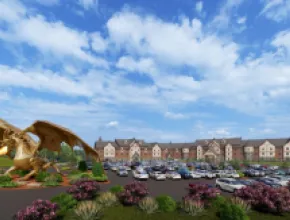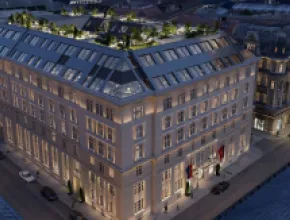By Chris Korman and Steve Kilar, Courtesy of The Baltimore Sun/McClatchy-Tribune Regional News
Caesars Entertainment, which plans to bring a casino to Baltimore, announced Thursday that it would spend $25 million more and hire 500 more people than originally planned to take advantage of opportunities presented by the passage of Question 7.
Caesars now will build a higher-end Horseshoe-brand casino rather than a Harrah's on the Baltimore site near M&T Bank Stadium that will focus on table games such as poker and black jack.
The Las Vegas-based company had long hinted it would invest more if Maryland expanded gambling because it believes it will draw dedicated cardplayers from around the country to the casino, which now will feature a World Series of Poker room and host series events.
The Horseshoe brand appeals to a younger crowd, analysts say. Caesars officials have gushed about the urban vibe of the Baltimore project and the possible synergy with nearby stadiums and neighborhoods. Thursday's announcement cemented the group's intentions of marketing the property as a more vibrant and hip alternative to its primary competition, the giant Maryland Live Casino located in the parking lot of a suburban mall in Hanover.
Horseshoe has a reputation, especially in the South and Midwest, as a "value-for-your-money" brand with its cowboy-inspired atmosphere, said William R. Eadington, a professor of economics at the University of Nevada and director of the Institute for the Study of Gambling and Commercial Gaming. Harrah's, he said, has a tendency to be more staid.
Horseshoe is supposed to be a step above Harrah's, said David G. Schwartz, director of the Center for Gaming Research at the University of Nevada, Las Vegas. But the Horseshoe brand is missing from Caesars biggest markets, including Las Vegas and Atlantic City, N.J. Caesars hasn't established a clear distinction among its brands, he said. "It's very nebulous right now."
"It's going to be very important for Caesars to build a unique presence that is going to be appealing to a particular niche," said James Karmel, a professor at Harford Community College who tracks the gambling industry. "What you have in a competitive environment, which Maryland is becoming, is particular casinos appealing to segments of the gaming crowd."
While the structure Caesars plans to build on Russell Street won't change much, the exterior finishes will be re-thought, said John Payne, one of Caesars two presidents. New plans will need to be presented to the city's architectural review board, but construction still should begin early next year, he said.
Horseshoe Baltimore is expected to cost $400 million and open in the middle of 2014. The company now will employ at least 1,700 people at the casino.
"Today's announcement by Caesars Entertainment, coming on the heels of the passage of Question 7, is great news for Baltimore," said Mayor Stephanie Rawlings-Blake, in a statement. "The addition of table games allows Caesars to build a larger and more exciting casino in the city, which will result in creating hundreds of more good-paying jobs for area residents and a greater capital investment in our downtown. A larger, more competitive facility only strengthens Baltimore's opportunities to create jobs, fund education and reduce property taxes for city homeowners."
Payne and Chad Barnhill, general manager of the Baltimore casino, offered few details Thursday and said Caesars had done only "legwork" on the switch from a Harrah's brand to Horseshoe. They said it would take several weeks to determine how the building's interior structure will change, though they anticipate adding more amenities to accommodate larger crowds.
They've yet to decide how many restaurants will be included, but they do plan on meeting with local restaurateurs to see if any are interested and would be a good fit. New plans also will include a theater seating at least 500 people.
The finish of the casino will be upgraded, Barnhill said, with a "richness" created by dark woods similar to those used in other Horseshoe casinos.
Only seven of the company's 39 U.S. casinos carry the Horseshoe brand. Harrah's bought the original Binion's Horseshoe in Las Vegas -- known as the birthplace of the World Series of Poker -- in 2004, but quickly sold the building and Binion name, retaining the Horseshoe name and the poker series. It later purchased Caesars.
Two of the company's most recent urban projects were Horseshoe casinos in Cleveland, which opened in May, and Cincinnati, scheduled to open next spring.
Payne said the company would offer every table game allowed by Maryland law and predicted between 80 and 110 tables in addition to the poker room.
The company still plans to buy all 3,750 video lottery terminals it has been allotted, but that, too, will be studied. The Horseshoe in Cleveland recently removed 200 slot machines and hopes to add more table games, which proved more popular there.
Caesars has parlayed the Horseshoe brand's history into a reputation for creating high-stakes, high-action gambling rooms, said Gregg Klein, a gaming industry analyst with Imperial Capital.
The brand's slogan is "Home of the Best Odds, Highest Limits & Biggest Jackpots." The Horseshoe in Cleveland has a $10,000 limit on all of its tables; at its other facilities, the limits can go well above that.
"Tables, in general, bring excitement to the floor ... It's a fun, popular brand," Klein said. "Horseshoe brings a more youthful energy."
Harrah's, on the other hand, is Caesars better-known brand (Caesars used to be known as Harrah's Entertainment Inc.) and is focused on slots, Klein said. It also caters to an older clientele, he said.
The slots-centric nature of Harrah's allows it to better serve its customers, said Dennis Forst, who analyzes Caesars for KeyBanc Capital Markets Inc.
"Harrah's is developing the reputation of having great customer loyalty," Forst said. "They track their slots players extremely well."
Slots make customer tracking simple because magnetic loyalty cards can be inserted into the machines. Such tracking is not as simple in casinos with table games.
The customer service style, therefore, is different at a casino like Horseshoe, Forst said.
"Horseshoe tries to connote to the gambling customer that there will be good odds at the tables and the dealers will be sophisticated," he said. "Harrah's connotes a more casual atmosphere with more things to do besides gamble."
The Horseshoe Baltimore could have an edge over other regional casinos among people who like dealer games because the brand is so strongly associated with high-quality table-gaming options, Forst suggested. He does not necessarily think the Horseshoe brand will draw customers from farther away than a Harrah's would.
"What it would do, just the brand name, is make someone who is partial to table games come to this property from within the Mid-Atlantic," he said.
Payne has made his expectations for the Horseshoe Baltimore clear.
"This facility will be able to compete with any of the facilities on the East Coast," Payne said.
The Horseshoe will be located a short drive from Maryland Live, the state's largest operating casino.
Located at Arundel Mills mall, Maryland Live brought in the bulk of the $39.6 million that Maryland's three casinos made in October, the Maryland Lottery and Gaming Control Agency announced Wednesday.
The casino generated $30.6 million from its 4,750 gambling machines. Owner Cordish Cos. has said it plans to hire 1,200 additional employees to staff table games.
Hollywood Casino Perryville, which is in Cecil County and has 1,500 machines, pulled in $5.5 million. The Casino at Ocean Downs, in Worcester County, made $3.5 million on its 800 machines.
Penn National, which owns Hollywood, has filed suit claiming the passage of Question 7 violated Maryland's constitution. The company, which owns Rosecroft race course in Prince George's and had hoped to build a casino there, appears poised to challenge the license that many expect will be awarded to an MGM-led bid to build a casino and hotel in National Harbor, across from D.C.
Caesars entry into the market in 2014 likely would siphon business from Maryland Live. The casino in Prince George's -- authorized by Question 7 -- could open no sooner than 2016 and will further saturate the market. A smaller facility in Rocky Gap also could open.
"What I see is that the big three," of National Harbor, Maryland Live and Horseshoe Baltimore, "will fight to draw crowds while the others become minor players," Karmel said. "And there's enough interest from people in the state to support that."
chris.korman@baltsun.com
twitter.com/chriskorman
steve.kilar@baltun.com
twitter.com/stevekilar
___
(c)2012 The Baltimore Sun
Visit The Baltimore Sun at www.baltimoresun.com





